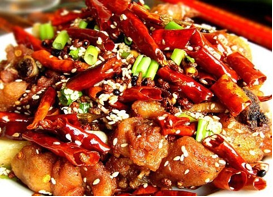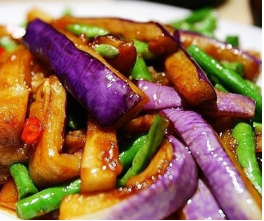by Kuang He, Yale University
I have long suffered from an obsession with spicy food. It turns my body into a fusion reactor, yet I still die for it. I heard that people in Szechuan and Hunan eat spicy food to withstand the damp and chilly weather. But for me, spicy food is atop the list even in the middle of the summer. After nine months of ‘I-eat-to-survive’ experience in America, the first thing I seek after I get off the plane is spicy food—tongue-cracking spicy food.
So here I am, sitting in Shanghai’s most popular Hunan Restaurant, South Memory. The furnishing is neat and classical, the price exceedingly acceptable. One of my all time favorite of all spicy food is a dish called Fried Chicken with Pepper. The English translation does not do it any justice. (I can go on forever complaining about translations like “broccoli and beef” or “chicken with garlic sauce.”) If one has not had much Szechuan or Hunan food, one would think that the restaurant is tight on ingredients, for one can only see a few pieces of chicken, submerged in a thick pile of chili peppers. While some people grumble about the scarcity of chicken, I have great fun plowing through the peppers, like a farmer digging taros from soil. To me, the dish is the work of a genius, because after maybe a 30-second search for a piece of chicken, or should I say, 30 seconds of desperate longing, the meat tastes particularly wonderful. In the very beginning, I taste the same crispiness that led to my addiction to deep-fried food. But after that it is really a fusion of flavors that mesmerizes my senses. From a tiny piece of chicken, I taste anything and everything: scallions, ginger, chili, sesame, happiness and satisfaction. Oh and yes, another flavor I feel obliged to mention is Szechuan pepper (again, not well translated). Wikipedia says that it creates a tingly numbness in the mouth; I say the Wikipedia guys haven’t fully tasted it yet. What it truly does is that it makes an earthquake in my mouth, cracking up my tongue and lips. Yet, I still desire the odd mixture of stimulation and numbness; it makes me suffer, but I cannot feel it.
For those that have been upset by my masochistic love of spiciness, I will recommend to them something known as a “buffer”—a non-spicy dish that helps to ameliorate the spiciness. Prior to this time I have ordered all sorts of “buffer” dishes, like fish ball soup, sticky rice cake, tofu with crab meat, etc. This time I decided to go with something real country style—something that can be made out of the freshness of a farmer’s backyard, eggplant with green beans. Frankly, I never understand why the dining hall always has to put eggplant between a layer of marinara sauce and a layer of cheese and steam it until it becomes a tray of mud. On the contrary, many kinds of Chinese food attempt to bring out original flavors, instead of adding random flavors. For this one dish all you need is eggplant, green beans and a bit of soy sauce. Well, I often think of soy sauce as a spoonful of fragrant soil. It explains why Chinese people cannot conceive of a lot of dishes that do not include any soy sauce, and why food tastes better when it looks darker. I reckon it is our intimacy with earth and soil that draw us to the dark-looking soy sauced food.
I still remember going to one of those southwestern provinces, where I could find little shabby foodplaces on the banks of rivers. There they have true country style food that tastes like fresh air. In comparison, it is a shame that city food always tastes like five-star hotel and concrete steel, while college food simply tastes like pages of old books.



